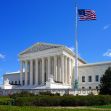The U.S. Postal Service cannot force an evangelical employee to work on Sundays, ruled the Supreme Court, without showing that allowing him to skip Sunday work would lead to substantial additional costs. The Court’s decision clarifies worker protections and enhances the burden on employers to overcome requests for religious accommodation.
Groff v. DeJoy involved a Christian postal worker who requested Sundays off in order to observe Sunday as a day of rest. The employee managed to dodge Sunday work for a time by transferring to a new location and taking additional shifts during the week, but his supervisor ultimately required him to work Sundays during the peak holiday season. The postal worker sued, claiming that being forced to work Sundays constituted religious discrimination.
The Civil Rights Act of 1964 prohibits discrimination against employees based on their religion. Employers must grant reasonable accommodations for employees to exercise their religious beliefs unless granting such an accommodation would cause the business “undue hardship.” For decades, many courts have interpreted “undue hardship” as requiring little more than a “de minimis” burden on the employer.
In a unanimous decision, the Court ruled that USPS must show that it would face more than de minimis harm if it hopes to deny a request for a religious accommodation. To deny religious accommodation, USPS--and other employers--must demonstrate that granting the accommodation would entail actual hardship. Proving undue hardship, according to the Court, means showing that the accommodation would subject the business to “substantial” harm, such as substantial additional cost. Courts must undertake a context-specific analysis to determine if a given accommodation would unduly burden the business in light of the circumstances surrounding the employer, the request, the anticipated cost, and other factors.
Part of the problem with the government’s argument in this instance was that much of the alleged harm claimed by the government affected only other workers, not the Postal Service itself. The petitioner’s refusal to work Sundays caused other employees to pick up the slack, taking on extra shifts and working longer hours. USPS, however, was still able to fulfill its contractual obligations. The government argued that the petitioner’s absences created a “tense atmosphere” in the workplace and led to “resentment toward management.” The majority emphasized that an impact on coworkers is relevant only insofar as it affects the conduct of the business.
The Court sent the case back for further analysis under the new standard. Per the Court, USPS will need to do more than merely “conclude that forcing other employees to work overtime would constitute an undue hardship;” they must consider other options such as voluntary shift-swapping, incentive pay, or coordinating with other offices to alleviate the burden. USPS may ultimately prevail, but it must do so under the “clarified context-specific standard.”
The case is another in a line of recent Supreme Court decisions favoring religious groups. In 2014, the Court ruled for the first time that a for-profit company could refuse to comply with a federal law requiring employer-funded health plans to include coverage for contraceptives. In 2022, the Court ruled for the first time that a state must fund religious activity as part of an educational aid program and sided with a public school football coach who prayed with players while on duty. The same week Groff v. DeJoy was decided, the Court also ruled in favor of a religious web designer who refused to work on same-sex wedding websites.
Unlike the other pro-religious freedom decisions, however, Groff v. DeJoy was decided by a unanimous Court. The Court’s liberal justices sided with the majority in ruling for the postal worker. Justice Sotomayor, joined by Justice Jackson, issued a concurring opinion clarifying that the Court was not fully overruling the precedent that led to the prior de minimis standard, nor was the Court explicitly ruling that a burden on coworkers can never constitute a sufficient undue hardship for the employer.






